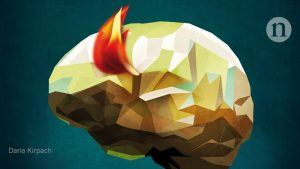Anna Nowogrodzki in Nature:
 Even in comparison to other types of cancer, brain cancer is particularly deadly. People with glioblastoma multiforme, one of the most common forms of brain cancer, have a median survival of less than 15 months after diagnosis. The US Food and Drug Administration (FDA) has so far approved only five drugs for treating brain cancer. Given this limited range, researchers could search for potential treatments among the wider pool of all FDA-approved drugs; however, any found to be effective would probably work in just a slim percentage of people with brain cancer.
Even in comparison to other types of cancer, brain cancer is particularly deadly. People with glioblastoma multiforme, one of the most common forms of brain cancer, have a median survival of less than 15 months after diagnosis. The US Food and Drug Administration (FDA) has so far approved only five drugs for treating brain cancer. Given this limited range, researchers could search for potential treatments among the wider pool of all FDA-approved drugs; however, any found to be effective would probably work in just a slim percentage of people with brain cancer.
Unfortunately, those with the condition do not have time to cycle through hundreds of drugs to find the one that might work. But if researchers could grow numerous small brain-like structures that contained a replica of the person’s tumour and then bathe them in various treatments, in the space of a few weeks, they might learn exactly which ones would have the best chance of fighting brain cancer in that individual. That’s the vision of Howard Fine, a neuro-oncologist at Weill Cornell Medicine in New York City who is developing such models, known as cerebral organoids, for the study of brain cancer — with the ultimate goal of finding the most appropriate treatment for each person. Organoids are miniature, laboratory-grown versions of the body’s organs. They contain several cell types and have a simplified 3D anatomy. They are particularly valuable for studying brain cancer because neither human brain tumours transplanted into mice nor human tumour stem cells grown in a culture dish behave in the same way as their counterparts in the body. At only five years old, the field of cerebral organoids is still young. Many challenges lie ahead, including how to give these organoids blood vessels, immune cells and a more realistic structure. But Fine and other researchers think that cerebral organoids might provide fresh opportunities for studying how tumours arise, screening drug candidates and developing evidence-based, personalized treatment plans for people with brain cancer.
More here.
